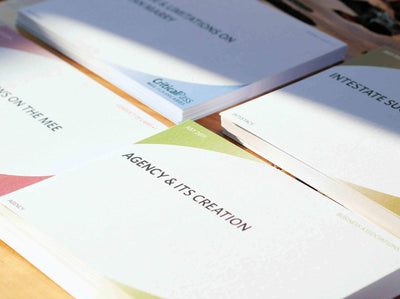How to distinguish what's important from what's not on the bar exam
When people fail the bar exam, one of the most common explanations is the failure to distinguish between what’s important and what’s not. Below we explain why this can be a disastrous trap during MBE and MEE prep, and how you can avoid it.
You can’t know everything
The stark reality is that, within the time constraints you have for bar prep, it’s impossible to know everything that’s covered in a standard bar prep course inside and out.
There are hundreds of pages of subject matter outlines you’re tasked with knowing. All of that content can, theoretically, appear on the bar exam. But only a fraction of it actually will, particularly on essays.
And what appears on the bar exam over the years is fairly consistent. So to give yourself a better chance at passing the bar exam and a more digestible plate of bar exam material to study, you need to separate out what's important and what's, practically speaking, far less important.
In short, you can separate all of the concepts that could appear on the bar exam into two broad categories: key concepts and minutiae.
Key concepts vs. minutiae
Key concepts are the issues you spend weeks learning about in your core law school classes. Think about big-ticket concepts like easements (in Real Property), negligence (in Torts), or personal jurisdiction (in Civ Pro).
These are the areas you need to make sure you have hammered down inside and out. Critical Pass Flashcards are designed to cover all of these key concepts.
Minutiae are the issues you see in bar prep that you never learned in law school, or that your professor breezed over. Think about discrete concepts like profit-a-prendre (Real Property), privilege of arrest (a defense to intentional torts), or quasi in rem jurisdiction (Civ Pro).
Is it possible that these issues could come up as a bar exam question? Maybe. But likely? No.
Why it matters
Minutiae comes up on the bar exam, if ever, as single MBE questions. Key concepts come up everywhere, on the MBE and on essays, and they appear repeatedly.
There is no way you’ll get through the bar exam without having to confront key concepts like easements, negligence, and personal jurisdiction.
Conversely, it’s easy to pass the bar exam without knowing a thing about profit-a-prendre, privilege of arrest, or quasi in rem jurisdiction. Why? Because chances are you’ll see at most one of these things come up, and if you miss that question, it’s fine because you’re not leaving any points on the table when it comes to the key concept questions.
The big takeaway
It is natural to get intimidated during bar prep by all of the information that can theoretically appear on the bar exam. If you approach bar prep with the mentality that you have to know all of it, you’re putting yourself at a deficit.
Quite simply, you can’t know everything with the time you have to study, at least not competently.
So put yourself in charge by controlling what you can control. And what you can control is mastering what you know is likely to be on the bar exam: the key concepts.
Learn the key concepts, including elements and definitions, inside and out. Review them using flashcards. And then spend time practicing applying your knowledge, in both MBE practice questions and practice essays. If you can master all of the key concepts, you’ll be in great shape for the bar exam.
YOU CAN PASS THE BAR EXAM. CRITICAL PASS CAN GET YOU THERE.
* MBE and MEE Essay Flashcards that help you learn and memorize key bar exam concepts, effectively and affordably.



